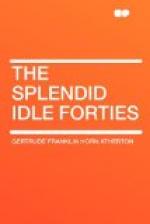El Rayo was not easily to be shaken off. A third of the distance had been covered, and his nose was abreast of Vitriolo’s flank. The vaqueros sat as if carved from sun-baked clay, as lightly as if hollowed, watching each other warily out of the corners of their eyes.
The black continued to gain. Halfway from home light was visible between the two horses. The pace became terrific, the excitement so intense that not a sound was heard but that of racing hoofs. The horses swept onward like projectiles, the same smoothness, the same suggestion of eternal flight. The bodies were extended until the tense muscles rose under the satin coats. Vitriolo’s eyes flashed viciously; El Rayo’s strained with determination. Vitriolo’s nostrils were as red as angry craters; El Rayo’s fluttered like paper in the wind.
Three-quarters of the race was run, and the rider of Vitriolo could tell by the sound of the hoof-beats behind him that he had a good lead of at least two lengths over the Northern champion. A smile curled the corners of his heavy lips; the race was his already.
Suddenly El Rayo’s vaquero raised his hand, and down came the maddening quirto, first on one side, then on the other. The spurs dug; the blood spurted. The crowd burst into a howl of delight as their favourite responded. Startled by the sound, Vitriolo’s rider darted a glance over his shoulder, and saw El Rayo bearing down upon him like a thunder-bolt, regaining the ground that he had lost, not by inches, but by feet. Two hundred paces from the finish he was at the black’s flanks; one hundred and fifty, he was at his girth; one hundred, and the horses were neck and neck; and still the quirto whirred down on El Rayo’s heaving flanks, the spurs dug deeper into his quivering flesh.
The vaquero of Vitriolo sat like an image, using neither whip nor spur, his teeth set, his eyes rolling from the goal ahead to the rider at his side.
The breathless intensity of the spectators had burst. They had begun to click their teeth, to mutter hoarsely, then to shout, to gesticulate, to shake their fists in each other’s face, to push and scramble for a better view.
“Holy God!” cried Pio Pico, carried out of himself, “the South is lost! Vitriolo the magnificent! Ah, who would have thought? The black by the gold! Ay! What! No! Holy Mary! Holy God!—”
Six strides more and the race is over. With the bark of a coyote the vaquero of the South leans forward over Vitriolo’s neck. The big black responds like a creature of reason. Down comes the quirto once—only once. He fairly lifts his horse ahead and shoots into victory, winner by a neck. The South has vanquished the North.
The crowd yelled and shouted until it was exhausted. But even Cabanares made no further demonstration toward De la Vega. Not only was he weary and depressed, but the victory had been nobly won.
It grew late, and they rode to the town, caballeros pushing as close to donas as they dared, duenas in close attendance, one theme on the lips of all. Anger gave place to respect; moreover, De la Vega was the guest of General Castro, the best-beloved man in California. They were willing to extend the hand of friendship; but he rode last, between the General and Dona Modeste, and seemed to care as little for their good will as for their ill.




